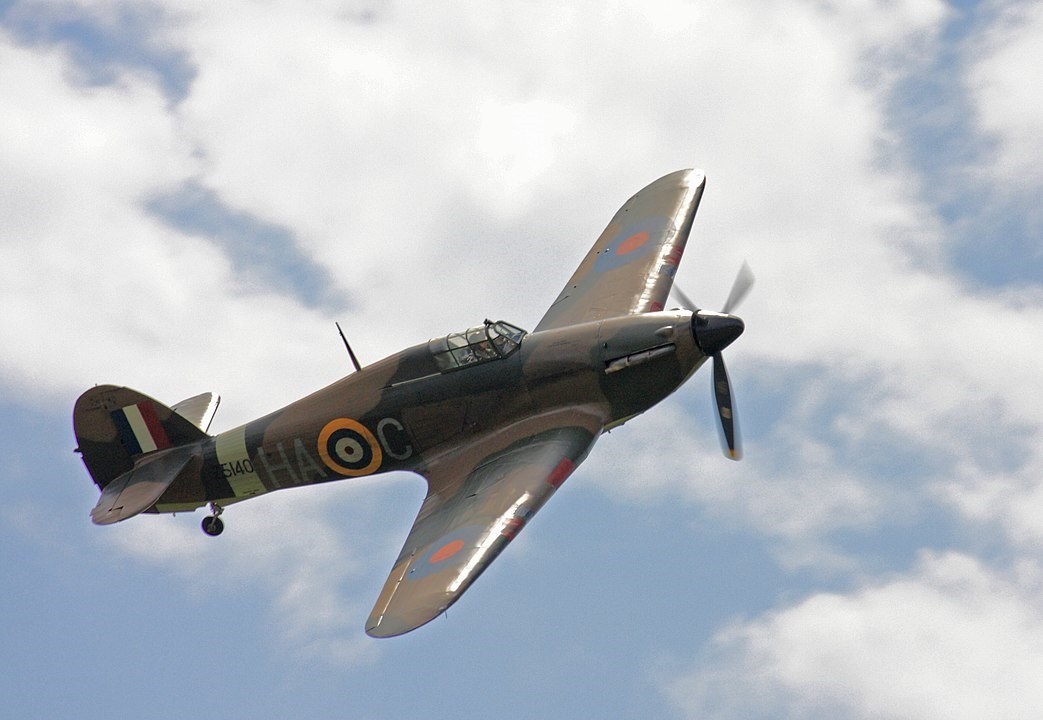On August Bank Holiday in 1939 our family were sitting on the beach at Bognor Regis enjoying the sea, sand and sunshine. Suddenly the quiet background of lots of people talking was shattered by the roar of 12 fighter planes flying along the coast. I found out later that they were Hurricanes – I had never seen that sort of plane before. As a 10 year old it was a complete thrill to see and hear them, and I could not understand why my parents were not equally thrilled. They were so serious and talking quite quietly about it. I only came to realise why later on.
Forward to Sunday 3rd of September: I was a choir boy, and came home from church at 12 noon, and found my Mother crying and my Father looking very grave. It was then that Father told me the country was at war with Germany. Mother was so upset because she had lost her brother in the Great War just twenty years earlier. To a 10 year old boy it seemed quite exciting and it was only when we got to school the next day and saw how serious the headmaster and the teachers were looking, that we realised this was something to be worried about.
At Assembly Mr. Linley the Headmaster told us we were at war and tried to explain what it all meant – Assembly took ages that day. Later in the month things started to happen. One day we were told to bring spades to school, or anything to dig with, and the top two classes were taken across to Mr Warwick’s field opposite the school playground, (where Southam clinic now stands). We were told to start digging trenches. They had to be dug in a zig-zag way all over the top part of the field and they had to be 2ft. deep. It took at least 2 days to do. We were told that when the air-raid sirens sounded we were to all run to the trenches and crouch down in them to protect us from enemy aircraft machine gun fire. Apart from the occasional practice run we never had to use them.
The next exercise in the school was to shield all the glass screens with fine wire netting, this was done by the older boys. The younger ones had to put masking tape across all the windows to protect us from flying glass if a bomb was dropped. Sometime later the school underwent further upheaval on the arrival of about 60 evacuees from Beccles and Dagenham and half of them were boys who had to be found school places. I remember that for a while we were sitting 3 to a desk, but at least we had an extra teacher who came with them, a Mr Miskin.
Also around that time Food Rationing came in and every one had to have a ration book and an identity card. These were obtained from the newly formed Food Office. You had to get your identity card first before you could have your ration book even though it was from the same office. Nearly everything was rationed: clothes, sweets, petrol, but bread and fruit were not. The bread was of one standard quality, rather dark but edible and fruit was always hard to come by, but most vegetables were available as people grew their own. Everyone was also issued with a Gas mask. These came in a 10 inch square box and were carried by a string shoulder strap. You had to carry them at all times, even school classes.
A well-known radio comedian, Rob Wilton, used to give humorous dialogues which always started with the phrase “The Day War Broke Out My Wife Said To Me” and were quite popular and the phrase became one of many among others that were used by people a lot of the time, pretty well all through the war. Other slogans were quite well known, such as ‘Put That Light Out’, ‘Dig For Victory’ ‘V For Victory’, ‘Yes We Have No Bananas’ and ‘Do You Want To Buy any Petrol Coupons?’ to name but a few.
This year’s commemorations of the 75th anniversary of “D” Day (June 6th 1944) reminded me that I was 15 years old at the time, and wondering whether the war would be over by the time I was 18. Fortunately for me, it ended in 1945, so I didn’t have to go to War, but I still had to do my two years’ National Service in 1947/49.
By Rowan Parker
If you are interested in finding out more about local history, call into the museum in Tithe Place on Tuesday, Friday and Saturday mornings from 10am to 12 noon. Contact: 01926 613503 email southamheritage@hotmail.com visit our website www.southamheritage.org and find us on Facebook: Southam Heritage Collection.


Leave A Comment